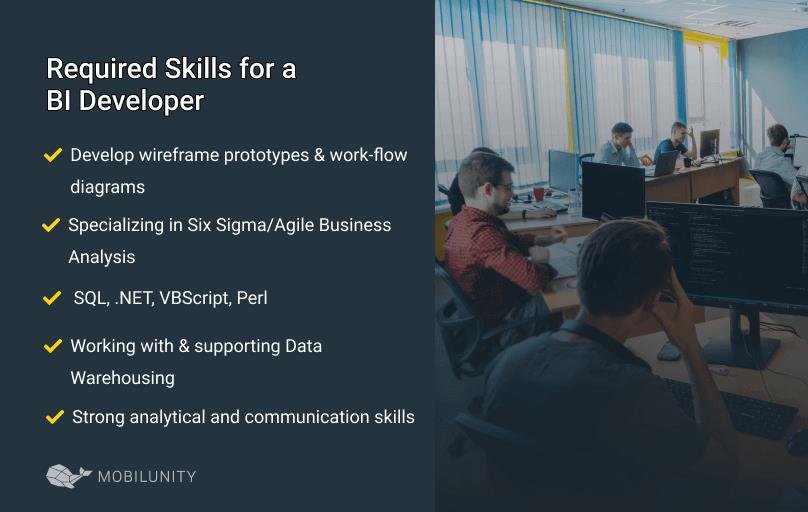As a rule, in one form or another, all the necessary information about your business is contained in various kinds of corporate systems. In a small company, you can maintain tables in Excel or enter data into a basic CRM; in a larger one, the data is scattered across numerous systems that help manage production, supply, warehouse, customer relations, and other areas. Why does a business need this information? To view reports and optimize everything, cut costs and increase profits? In fact, approximately this is the case. Only the content of management decisions depends entirely on the depth of analysis of the available information.
Business Intelligence and Everything You Need to Know About It
Business intelligence is a collection of computer practices and tools for companies that turn transactional business information into a form suitable for business analysis for working with information processed this way.
Business analytics, unlike BI, deals with already cleansed information prepared for analysis and uses statistical and quantitative tools to assess the current situation and forecast. Therefore, it is increasingly called “in-depth analytics.”
BI deals with cleaning the data with its further transformation into a convenient format. The goal here is to interpret a large amount of data, focusing only on the key factors that affect efficiency, model the outcome of various options for action, and track decision-making results. The main goal of BI is only the process of making business decisions.
A great number of company decisions find their support within BI, regardless of their core. Major operational choices include product positioning or pricing. A BI system works best by adding information from the market in which the enterprise operates (external data) with data from sources within the enterprise, such as financial and production (internal data). When combined, external and internal data present a complete description of the business, i.e., analytics that cannot be obtained as a result of analyzing data from only one of these sources.
Why You Should Hire Business Intelligence Engineer
It is impossible to collect and process all the company’s data manually. Some of the information remains unprocessed. A company can accidentally miss customer requests, fail to learn about production disruptions in a timely manner, and lose money due to ignoring problems. A decision to hire a business intelligence engineer can be the right one to make in this situation. This kind of specialist will be able to make sure that the company’s integration of BI systems is done flawlessly and according to its goals and needs.
Here are some of the main tasks solved by means of BI systems that your company can benefit from:
- Collecting data from different sources, structuring and storing them in a single system;
- Analysis of large amounts of data to form and confirm hypotheses or to develop business solutions with analytics in mind;
- Modeling possible solutions to assess their impact on the bottom line and forecasting future development based on the available data;
- Formation of operational and strategic reporting, including notification of deviations of indicators from acceptable standards;
- Preservation and systematization of knowledge for the purpose of subsequent transfer to new employees, so that experience is preserved and the quality of work is steadily increased;
The overall goal of BI is to empower businesses to make well-rounded decisions with full analytics. A company with BI implementation will have complete, accurate, and organized data.
Roles and Responsibilities of a Business Intelligence Engineer
BI developers constantly interact with data and data warehouses, so they use analytical software in their
work. Also, deep knowledge of the declarative programming language SQL, foreign language, and corporate data warehouses (QCD) is extremely important. The main responsibilities of a BI developer include the following:
- Design and implementation of various data warehouses for business intelligence systems;
- Support of the existing analytics systems;
- Data analysis, reporting, development of bots for process automation.

Source:Mobilunity
Of course, responsibilities depend on the place of work and the specifics of the company’s activities. In any case, a BI developer must have good knowledge of management, business processes, and information technology.
It is also important to pay attention to the Amazon business intelligence engineer’s soft skills. BI engineers constantly communicate with company executives, so communication skills are very important. They must have a good memory, have confidence in their abilities. BI engineers spend most of their time at the computer, so perseverance, ability to concentrate, high speed, and pedantry in work processes dominate their character.

Source:Mobilunity
Tips and Tricks of Hiring an Intelligence Engineer
BI engineers can bring a lot of value to the business as BI solutions are able to provide a company with an answer to a number of important questions:
- how effective are certain business processes;
- whether resources are being used rationally;
- what will happen if you do this or that.
To make sure that you are able to hire the best kind of specialist it is important to be prepared. First of all, you need to learn about the typical business intelligence engineer salary. Knowing the business intelligence engineer amazon salary will help you find a perfect balance in your future employee’s rate and set of skills. You can find a comparison table for such specialists’ rates in different countries down below.
| USA | UK | Germany | Spain | Ukraine | |
| $ annual rate | $90,207 | $49,909 | $55,033 | $31,740 | $18,072 |
Apart from the amazon business intelligence engineer salary, you should consider the skill set of your potential hire. They should be fluent in Python and Java microservices. They should also have broad experience using any of the BI visualization tools, for example, Looker or Tableau. SQL experience is also something that you should look for in your potential business intelligence engineer.
Final Thoughts
Online business intelligence tools are becoming the business standard for collecting data, analyzing, and delivering information in real-time. And built-in visualization, which provides dynamic interaction, makes it possible for each interested person to receive the necessary information on time. This creates a holistic picture of the business at all levels of management. Remember that your data is a valuable asset, and your business’s future depends on how you organize your work with data. Business Intelligence turns multiple disparate data into actionable information to guide and manage your business, test hypotheses, and make decisions. Those who use such strategies have accurate, complete, and organized data. This helps to assess the current state of the business, identify problems and opportunities, and plan future development.

